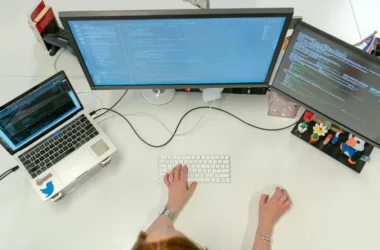The digital world we inhabit relies heavily on the expertise of software developers. But what exactly is the software developer job description?
From the social media apps on your phone to the complex systems that power businesses, software developers are the architects behind the scenes, crafting the applications that shape our daily lives.
This comprehensive software developer job description dives into the core responsibilities, required skills, and exciting specializations within the software development landscape.
Core Responsibilities: Wearing Many Hats
Software developers are the driving force behind the software development lifecycle. Their responsibilities encompass a multifaceted blend of technical expertise and problem-solving skills:
From Concept to Code
They collaborate with designers and stakeholders to understand project requirements. This might involve translating ideas into technical specifications, defining features, and creating the software’s overall architecture.
Once the blueprint is in place, they bring the vision to life by writing code using various programming languages and tools.
Problem-Solving Aficionados
Software development is an intricate dance between innovation and troubleshooting. Developers excel at identifying and addressing challenges. They analyze complex problems, dissect user needs, and devise creative solutions through the power of code.
This might involve debugging errors, optimizing performance, or implementing new features to meet evolving requirements.
Building Scalable Systems
Imagine a social media platform with millions of users – the software needs to function smoothly despite the massive amount of data and activity. Software developers ensure the applications they build can handle large volumes of data and users.
This involves optimizing code for performance, implementing security measures, and ensuring the overall reliability and scalability of the software system.
Collaboration is Key
Software development is rarely a solitary endeavor. Developers work closely with a diverse team to bring projects to fruition.
This includes designers who translate visual concepts into technical specifications, testers who identify and fix bugs in the code, and other developers to ensure different parts of the software system work seamlessly together.
Effective communication and teamwork are central to the success of any software development project.
Continuous Learners
The tech landscape is a fast-paced environment, and software developers are lifelong learners by necessity. New programming languages, frameworks, and technologies emerge frequently.
They are committed to continuous learning, actively seeking opportunities to expand their skills and stay updated with the latest trends. This might involve taking online courses, attending conferences, or participating in open-source projects.
Beyond the Technical: The Essential Soft Skills
While technical expertise is paramount, don’t underestimate the importance of soft skills in a software developer’s toolkit. These include:
- Communication: The ability to clearly convey technical concepts to both technical and non-technical audiences is crucial.
- Critical Thinking: Analyzing problems, identifying root causes, and devising effective solutions are essential for successful development.
- Teamwork: Collaboration with designers, testers, and other developers is key to project success.
- Time Management: Meeting deadlines and managing multiple tasks efficiently are important aspects of the job.
- Problem-Solving: Software development is an iterative process filled with challenges. The ability to troubleshoot, debug, and find creative solutions is essential.
Specializations: Catering to Diverse Interests
The world of software development offers a variety of specializations to align with specific skill sets and interests. Here are some of the most common paths software developers can pursue:
Front-End Developer
The architects of the user experience, front-end developers focus on the visual elements and interactive features of a website or application. They utilize HTML, CSS, and JavaScript to create user-friendly interfaces that are both aesthetically pleasing and functionally sound.
Back-End Developer
The masterminds behind the scenes, back-end developers craft the server-side logic that powers web applications and websites.
They work with programming languages like Python, Java, and PHP to build the core functionalities, manage databases, and ensure smooth interaction between the user interface and the server.
Full-Stack Developer
A versatile individual, the full-stack developer possesses expertise in both front-end and back-end development. They can handle all aspects of software creation, from designing user interfaces to building the underlying functionalities.
Mobile App Developer
As the name suggests, mobile app developers specialize in creating applications for smartphones and tablets. They leverage tools and programming languages specific to mobile operating systems (iOS, Android) to bring mobile-first experiences to life.
DevOps Engineer
Bridging the gap between development and operations, DevOps engineers ensure a smooth software development lifecycle.
They automate tasks, implement continuous integration and continuous delivery (CI/CD) practices, and collaborate with both developers and operations teams to streamline the software delivery process.
Data Science/Machine Learning Engineer
This specialization blends software development with statistical analysis and machine learning techniques. Data science/machine learning engineers develop algorithms
wrangle and analyze data, and build data-driven applications that extract insights and solve complex problems.
Finding Your Niche: Choosing a Specialization
The choice of specialization depends on your individual interests and skillset. Here are some factors to consider when deciding on your path:
- Technical Skills: What programming languages are you most comfortable with? Do you enjoy working on user interfaces or server-side logic?
- Interests: Are you drawn to the visual aspects of applications or the intricacies of data analysis?
- Career Goals: What type of work environment are you seeking? Do you prefer a generalist role or a more specialized track?
Thriving in a Dynamic Landscape: The Future of Software Development
The software development landscape is constantly evolving, with new technologies and trends emerging on a regular basis. Here are some exciting areas that hold immense potential for the future:
- Artificial Intelligence (AI) and Machine Learning (ML): Software developers will play a crucial role in integrating AI and ML into various applications, transforming industries, and shaping the future of technology.
- Cloud Computing: The continued rise of cloud computing will necessitate developers with expertise in building and deploying applications on cloud platforms.
- Internet of Things (IoT): The ever-expanding network of connected devices will require developers who can create software to manage, analyze data from, and interact with these devices seamlessly.
Conclusion
A career in software development offers a dynamic and stimulating environment where continuous learning and innovation are paramount.
By honing your technical skills, cultivating essential soft skills, and choosing a specialization that aligns with your interests, you can position yourself for a successful and rewarding journey in the ever-evolving digital world.
Software developers are the architects of our digital reality, and the possibilities for shaping the future with code are limitless.
FAQs on software developer job description
What are the daily tasks of a software developer?
Software developers wear many hats throughout the day. They might start by collaborating with designers on a new feature, then move on to writing code, debugging errors, testing functionality, and documenting their work.
They also participate in code reviews with other developers and attend meetings to discuss project progress.
What skills do I need to become a software developer?
Strong technical skills are essential, including proficiency in programming languages (e.g., Python, Java, JavaScript), problem-solving abilities, understanding of data structures and algorithms, and familiarity with software development methodologies.
Soft skills like communication, teamwork, critical thinking, time management, and a passion for learning are also crucial.
Is a computer science degree necessary to become a software developer?
A computer science degree can be a helpful path, but it’s not the only option. Bootcamps, online courses, and self-learning can equip you with the necessary skills for some entry-level software development roles.
The most important factor is a strong foundation in programming languages and problem-solving abilities.
What are the different types of software developer jobs?
There are many specializations within software development, each with its own focus area. Here are a few examples:
- Front-End Developer
- Back-End Developer
- Full-Stack Developer
- Mobile App Developer
- DevOps Engineer
- Data Science/Machine Learning Engineer
What is the salary range for software developers?
Starting salaries for software developers can vary depending on location, experience level, and the specific company. However, software development is generally a well-paying field, with many opportunities for career growth and salary increases.
Is software development a stressful job?
Software development can be stressful at times, especially when facing deadlines or complex technical challenges. However, many developers find the work intellectually stimulating and rewarding.
Effective time management, strong communication skills, and a supportive work environment can help mitigate stress levels.
What is the job outlook for software developers?
The job outlook for software developers is excellent. The Bureau of Labor Statistics projects a 13% growth rate for software developer jobs from 2020 to 2030, much faster than the average for all occupations.
How can I learn more about software development careers?
There are many resources available online and in libraries to learn more about software development careers. You can also attend coding boot camps, workshops, or conferences to gain practical experience and network with professionals in the field.






